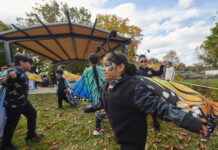Cultivate your student’s success with five essential skills to make her life smart, not just book smart.
1. Growth mindset
What is it? Smart kids define intelligence as continued learning, not as a fixed trait. Research by developmental psychologist Carol Dweck, PhD, and her colleagues shows kids who think of intelligence as an innate ability give up quickly when challenged. Kids with a growth mindset seek challenges, think creatively and thrive despite setbacks.
How to build it. Reinforce the belief that talents are developed, not a matter of biological inheritance, Dweck counsels. Praise your child for effort and persistence, rather than for intelligence. Share stories of scientists, athletes and artists who model a passion for learning and growth.
2. Metacognitive understanding
What is it? Smart kids think about their own thinking: They can grasp multiple perspectives and recognize their own biases and assumptions. “Metacognition isn’t about grades,” says Leif Gustavson, PhD, associate professor of education at Arcadia University in Glenside, PA, “but it helps kids study efficiently and use knowledge effectively.”
How to build it. When your child completes an assignment or exam, ask “How did it go? What went well? What would you do differently next time?” Also, ask kids to connect previous learning to new experiences, Gustavson advises, to help them achieve deeper understanding.
3. Investigative approach
What is it? Smart kids can define a problem, formulate options, test potential solutions and decide on a course of action. “Classroom teachers struggle with how to make science, technology, engineering and math learning more hands-on,” says Dave Hespe, co-acting executive director of Liberty Science Center in Jersey City, NJ. Zoos, aquariums, parks and science centers are fantastic learning laboratories.
How to build it. Teach investigative concepts and skills at each stage of your child’s development. Engage your kids’ curiosity outside the classroom and model problem-solving strategies.
4. Emotional intelligence
What is it? Smart kids recognize and regulate their own emotions and empathize with others. “Kids who develop these skills early in life get better grades, are less susceptible to anxiety and depression and have healthier, more fulfilling relationships,” says Linda Lantieri, MA, director of the Inner Resilience Program and co-founder of the Resolving Conflict Creatively Program, a social and emotional learning program implemented in more than 400 schools.
How to build it. Regulating emotions doesn’t mean stifling them, says Lantieri. Increase your child’s emotion-related vocabulary by teaching words like angry, frustrated and excited. Encourage your child to explore his feelings and take others’ emotional perspective to learn empathy.
5. Self-expression
What is it? Smart kids develop a strong sense of self. Kids may feel pressured by intense demands to get good grades, fit in socially and grow up before they’re ready, says Brandie Oliver, MS, assistant professor of counselor education at Butler University in Indianapolis, IN. Kids need skills to stand up for themselves.
How to build it. “It is common for parents to think they are in the loop when they don’t know as much as they think,” Oliver cautions. Listen deeply to your child and encourage sharing. Validate your child’s perspective, even when you don’t agree.
When you give kids the skills to direct their own learning and express their ideas, you facilitate success in school and in life. Now that’s smart.
Heidi Smith Luedtke is a personality psychologist and the author of Detachment Parenting.






